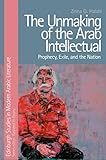The Unmaking of the Arab Intellectual : Prophecy, Exile and the Nation / Zeina Halabi.
Material type: TextSeries: Edinburgh Studies in Modern Arabic Literature : ESMALPublisher: Edinburgh : Edinburgh University Press, [2022]Copyright date: ©2017Description: 1 online resource (216 p.) : 5 B/W illustrationsContent type:
TextSeries: Edinburgh Studies in Modern Arabic Literature : ESMALPublisher: Edinburgh : Edinburgh University Press, [2022]Copyright date: ©2017Description: 1 online resource (216 p.) : 5 B/W illustrationsContent type: - 9781474421393
- 9781474421409
- 892.76 23
- PJ7517 .H33 2017
- PJ7517 .H33 2017
- online - DeGruyter
| Item type | Current library | Call number | URL | Status | Notes | Barcode | |
|---|---|---|---|---|---|---|---|
 eBook
eBook
|
Biblioteca "Angelicum" Pont. Univ. S.Tommaso d'Aquino Nuvola online | online - DeGruyter (Browse shelf(Opens below)) | Online access | Not for loan (Accesso limitato) | Accesso per gli utenti autorizzati / Access for authorized users | (dgr)9781474421409 |
Frontmatter -- Contents -- List of Figures -- Series Editor’s Foreword -- Note on Translation and Transliteration -- Acknowledgements -- Preface -- Introduction: In the Beginning was the Word -- 1 Requiem for the Enlightenment -- 2 Elegy for the Intellectual -- 3 The Banality of Exile -- 4 Ruins of Secular Nationalism -- 5 The Political Remains -- Bibliography -- Index
restricted access online access with authorization star
http://purl.org/coar/access_right/c_16ec
Examines the depiction of intellectuals in contemporary Arabic literatureZeina G. Halabi examines the unmaking of the intellectual as prophetic figure, national icon, and exile in Arabic literature and film from the 1990s onwards. She comparatively explores how contemporary writers and film directors such as Rabee Jaber, Rawi Hage, Rashid al-Daif, Seba al-Herz and Elia Suleiman have displaced the archetype of the intellectual as it appears in writings by Elias Khoury, Edward Said, Jurji Zaidan and Mahmoud Darwish. In so doing, Halabi identifies and theorises alternative articulations of political commitment, displacement, and loss in the wake of unfulfilled prophecies of emancipation and national liberation. The Unmaking of the Arab Intellectual offers critical tools to understand the evolving relations between aesthetics and politics in the alleged post-political era of Arabic literature and culture.Key FeaturesExamines the depiction of Arab intellectuals in post-1990s literatureOffers a new understanding of the political in the contemporary eraRe-reads the legacy of canonical modern Arab writersOffers critical tools to understand the contemporary eraRead a review by Michael Allan (University of Oregon)Listen to Zeina Halabi discuss the book on the Forum for Transregional Studien in Berlin blogMaydan interviews Zeina Halabi - read the full article Read a review in Arabic Literature "
Mode of access: Internet via World Wide Web.
In English.
Description based on online resource; title from PDF title page (publisher's Web site, viewed 29. Jun 2022)


